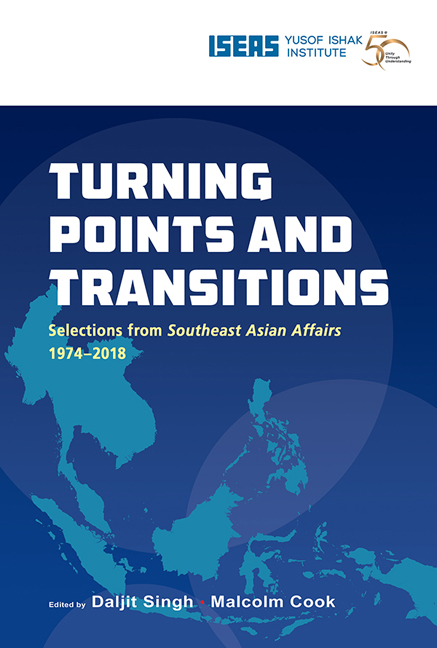Book contents
- Frontmatter
- Contents
- Message from the Director
- Foreword
- Foreword
- Introduction
- THE REGION
- The Diplomatic Emergence of China and Its Implications for Southeast Asia (1975*)
- Stability and Security in the Region after ANZUK (1975)
- The Question of the “Overseas Chinese” (1976)
- Southeast Asia 1976: The Handling of Contradictions (1977)
- The “Fukuda Doctrine” and Its Implications for Southeast Asia (1978)
- Expanding Horizons in Southeast Asia? (1994)
- AFTA in the Light of New Economic Developments (1995)
- The ASEAN Economic Miracle Unravels (1999)
- Southeast Asia in 1999: A False Dawn? (2000)
- East Timor's Future: Southeast Asian or South Pacific? (2001)
- Southeast Asia in 2002: From Bali to Iraq — Co-operating for Security (2003)
- The Year in ASEAN: The Charter, Trade Agreements, and the Global Economic Crisis (2010)
- Seeking Stability in Turbulent Times: Southeast Asia's New Normal? (2015)
- China's Two Silk Roads Initiative: What It Means for Southeast Asia (2015)
- China's International Strategy and Its Implications for Southeast Asia (2016)
- BRUNEI
- CAMBODIA
- INDONESIA
- LAOS
- MALAYSIA
- MYANMAR
- THE PHILIPPINES
- SINGAPORE
- THAILAND
- VIETNAM
Southeast Asia in 1999: A False Dawn? (2000)
from THE REGION
Published online by Cambridge University Press: 29 May 2019
- Frontmatter
- Contents
- Message from the Director
- Foreword
- Foreword
- Introduction
- THE REGION
- The Diplomatic Emergence of China and Its Implications for Southeast Asia (1975*)
- Stability and Security in the Region after ANZUK (1975)
- The Question of the “Overseas Chinese” (1976)
- Southeast Asia 1976: The Handling of Contradictions (1977)
- The “Fukuda Doctrine” and Its Implications for Southeast Asia (1978)
- Expanding Horizons in Southeast Asia? (1994)
- AFTA in the Light of New Economic Developments (1995)
- The ASEAN Economic Miracle Unravels (1999)
- Southeast Asia in 1999: A False Dawn? (2000)
- East Timor's Future: Southeast Asian or South Pacific? (2001)
- Southeast Asia in 2002: From Bali to Iraq — Co-operating for Security (2003)
- The Year in ASEAN: The Charter, Trade Agreements, and the Global Economic Crisis (2010)
- Seeking Stability in Turbulent Times: Southeast Asia's New Normal? (2015)
- China's Two Silk Roads Initiative: What It Means for Southeast Asia (2015)
- China's International Strategy and Its Implications for Southeast Asia (2016)
- BRUNEI
- CAMBODIA
- INDONESIA
- LAOS
- MALAYSIA
- MYANMAR
- THE PHILIPPINES
- SINGAPORE
- THAILAND
- VIETNAM
Summary
If 1998 was the year of economic crisis, 1999 was the year of recovery. The pervasive gloom of 1998 receded somewhat, but Southeast Asia still, at best, presented a mixed picture. Economic recovery among the older members of the Association of Southeast Asian Nations (ASEAN) generated a palpable sense of optimism. Even Indonesia, with its battered economy, could inspire some hope after it held a relatively peaceful and fair parliamentary election, followed by a presidential election which resulted in the establishment of a democratic government with the moral and political legitimacy to govern. But there was also tragedy, followed by humanitarian intervention, in East Timor and, for Indonesia, enormous uncertainties remained. Elsewhere, the reforms needed to deal with the weaknesses in state and corporate governance which the crisis had highlighted were only partially addressed, raising doubts about the sustainability of the recoveries. Conditions in Laos, Myanmar, and Vietnam were worse than in 1998. The durability of the new democracy in Indonesia was not assured, while in the rest of Southeast Asia, progress towards more tolerant, enlightened, and democratic societies was patchy, mixed with stasis, even regression.
ASEAN sought to overcome a crisis of credibility. The broader Asia-Pacific strategic environment remained relatively benign. There were, however, more signs of Sino-American competition. China's claims and posture in the South China Sea remained a troubling long-term strategic lever against Southeast Asia.
The Association of Southeast Asian Nations
A Question of Credibility
ASEAN has become a feeble managing vehicle [of the Southeast Asian regional order] … ASEAN has been diminished in international standing and, in important respects, is not the same entity that was set up in 1967 based on a set of common understandings about reconciliation among governments of convergent political outlooks. (Michael Leifer)
ASEAN has overextended itself — with members so vastly different as Myanmar and Singapore it has lost credibility, and its ability to provide any semblance of security across maritime Southeast Asia has been undermined. (Paul Dibb)
ASEAN's inability to deal with the challenges posed by intransigent regimes in Myanmar and Cambodia was mirrored by its ineffectiveness in dealing with transnational issues … ASEAN disarray throughout the year was the product of many factors … (Carlyle A. Thayer)
- Type
- Chapter
- Information
- Turning Points and TransitionsSelections from Southeast Asian Affairs 1974-2018, pp. 91 - 100Publisher: ISEAS–Yusof Ishak InstitutePrint publication year: 2018

